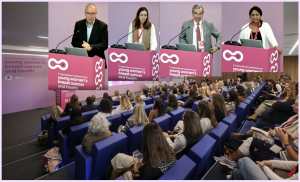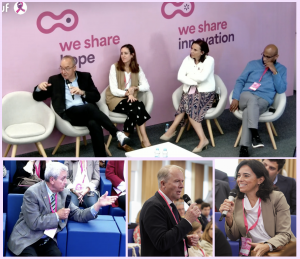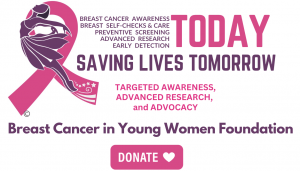BCYW Foundation Experts Share Insights on Advancing Breast Cancer Treatment and Personalized Care for Young Women
Breast Cancer in Young Women Foundation Experts on Refining Treatment Strategies, Personalizing Care, and Balancing Chemotherapy with Patient Preferences
DENVER, CO, UNITED STATES, December 13, 2024 /EINPresswire.com/ -- Breast Cancer in Young Women (BCYW) remains one of the most complex diseases to treat, and ongoing advancements in research and clinical practice are essential to improving patient outcomes. At the BCYW Foundation’s International Conference in Lisbon, leading global breast oncologists shared the latest INTERVENTIONAL APPROACHES for addressing medical challenges young women face with breast cancer.BALANCING SIDE EFFECTS AND NEW STANDARD OF CARE
Dr. Michael Gnant from the Comprehensive Cancer Center at the Medical University of Vienna, Austria, delivered an insightful presentation exploring the evolving standard of care in breast cancer treatment. He emphasized the necessity of tailoring therapies to individual patients, particularly given the variability in side effects from chemotherapy and immune checkpoint inhibitors.
“Side effects can have a profound impact on treatment decisions and quality of life,” Dr. Gnant noted, stressing the importance of clear communication between healthcare providers and patients. Improved dialogue, he argued, can ensure patients are better informed about potential long-term effects and empowered to make decisions aligned with their health priorities.
New treatment approaches were a focal point of Dr. Gnant’s talk, including the concept of dynamic endocrine responsiveness. This strategy, particularly relevant for patients with low receptor expression, offers the potential to avoid aggressive treatments like chemotherapy while still achieving effective outcomes. He also highlighted the integration of newer agents into treatment regimens, paving the way for more personalized and effective therapies.
For patients at lower risk, Dr. Gnant advocated against over-treatment, warning that “escalating therapies unnecessarily can increase side effects without delivering significant benefits.” He also touched on the ongoing debate regarding extending treatment durations beyond five years, a complex topic that underscores the need for continued research and evolving clinical decision-making.
Looking ahead, Dr. Gnant expressed optimism about the role of genomic technologies in shaping the future of breast cancer care. With over 20 endocrine agents currently in development,” he foresees expanded options that might enable more precise and individualized treatments. However, he also cautioned that challenges remain, particularly in bridging communication gaps between physicians and patients. “Continued research, education, and proactive communication are vital to advancing breast cancer management,” he concluded.
REFINING CHEMOTHERAPY DECISIONS THROUGH PERSONALIZED STRATEGIES
Isabel Echavarria, a medical oncologist from Hospital General Gregorio Marañón in Madrid and a Spanish Society of Medical Oncology representative, Spain, emphasized the need for personalized chemotherapy decisions based on individual risk profiles. Her presentation showed how chemotherapy benefits vary significantly depending on patient-specific factors.
Dr. Echavarria emphasized that younger women under 50 often show no significant benefit from chemotherapy. In contrast, “Patients with a chemotherapy score over 25 generally have excellent prognoses and benefit significantly from treatment to reduce relapse risk.” She reinforced the need to evaluate chemotherapy for these cases carefully; “Early benefit indications, typically observable within two weeks of starting therapy, were identified as particularly relevant for high-risk patients, as they signal the likelihood of long-term benefits.”
Dr. Echavarria's talk concluded with a focus “on minimizing unnecessary treatments for low-risk patients, for whom chemotherapy often provides little to no benefit.” She underscored the importance of integrating individual risk profiles and early treatment responses to maximize therapeutic outcomes while sparing patients from avoidable side effects. “By tailoring chemotherapy decisions, we can pave the way for more effective and personalized breast cancer care,” she stated.
PUTTING PATIENT’S PREFERENCES AT THE CENTER OF BREAST CANCER CARE
Dr. Luis Costa Luis Costa from the Unidade Local de Saúde de Santa Maria and the University of Lisbon, Portugal, emphasized the importance of aligning treatment strategies with patient preferences, advocating for a more personalized and patient-centered approach to breast cancer care. He highlighted the need to understand each patient’s unique goals, such as maintaining the ability to work, drive, or care for family members. “Integrating patient preferences into treatment plans ensures their quality of life is preserved during and after treatment,” he said, emphasizing the value of collaboration and communication in oncologic care.
Dr. Costa also explored the interplay between tumor biology and treatment decisions, noting the global variability in breast cancer outcomes and responses due to differences in tumor types and detection timing. He described drug resistance as a significant challenge, often requiring innovative strategies when cancers relapse after initial treatments fail. Advances in imaging techniques and genomic technologies were noted as key tools in modern breast cancer care, enabling a more precise understanding of tumor biology and treatment effectiveness.
Dr. Costa expressed optimism about ongoing research and clinical trials to improve survival rates while prioritizing patients’ quality of life. “By combining cutting-edge science with patient-centered approaches, we are making strides in the fight against breast cancer,” he remarked.
IMMUNE CHECKPOINT INHIBITORS IN BREAST CANCER TREATMENT
Dr. Hyma Vani Polimera from Penn State College of Medicine, Hershey, USA, discussed the transformative role of immune checkpoint inhibitors in treating triple-negative breast cancer (TNBC) and high-risk hormone receptor-positive breast cancer. These inhibitors enhance the immune system’s ability to target and destroy cancer cells, representing a revolutionary advance in oncology.
Dr. Polimera reviewed a few landmark clinical trials that underscore the efficacy of these therapies for specific breast cancer subtypes. She also highlighted the challenges associated with immune checkpoint inhibitors, including notable side effects such as hypothyroidism and adrenal insufficiency. These side effects, she explained, can have long-term impacts on fertility and overall health, particularly for younger women.
“Fertility preservation is recommended post-treatment, but robust guidelines remain lacking,” she added. Dr. Polimera called for further research to address the needs of underrepresented patient populations and improve long-term treatment strategies. “While checkpoint inhibitors represent a significant advancement, continued investigation is crucial to ensure the best outcomes for all patients,” she concluded.
ABOUT THE BCYW FOUNDATION
The BCYW Foundation is a global organization dedicated to advancing research, raising awareness, and providing support to young women affected by breast cancer. Through partnerships and advocacy, the foundation is committed to creating a future where no young woman feels overlooked in her fight against this disease. The BCYW Foundation relies on individual contributions and sponsors to raise the funds necessary to support its mission. Donate to BCYW Foundation: Every contribution – big or small – helps the BCYW Foundation fulfil its mission to save the lives of young women from breast cancer in the years to come. Thank you for your generosity.
Rakesh Kumar, Ph.D., Founder and CEO
Breast Cancer in Young Women Foundation
bcywf@breastcancerinyoungwomen.org
Visit us on social media:
Facebook
X
LinkedIn
Instagram
YouTube
Legal Disclaimer:
EIN Presswire provides this news content "as is" without warranty of any kind. We do not accept any responsibility or liability for the accuracy, content, images, videos, licenses, completeness, legality, or reliability of the information contained in this article. If you have any complaints or copyright issues related to this article, kindly contact the author above.



